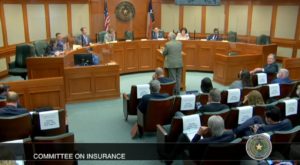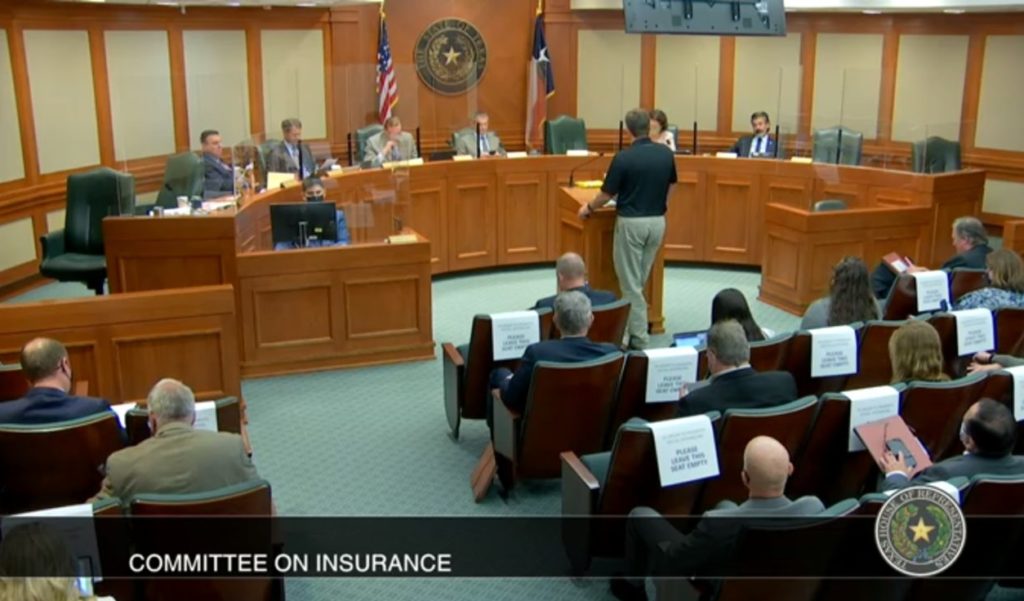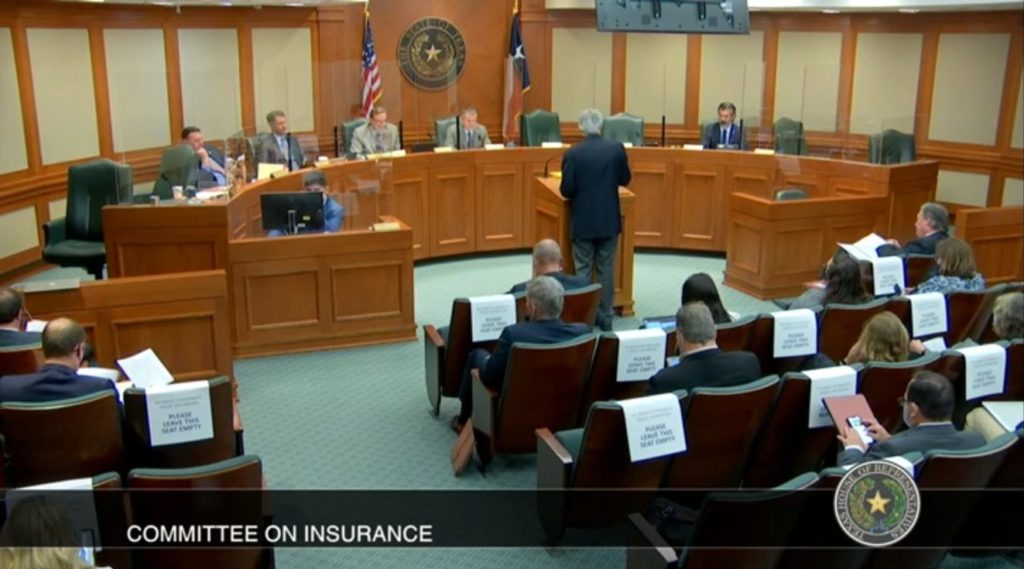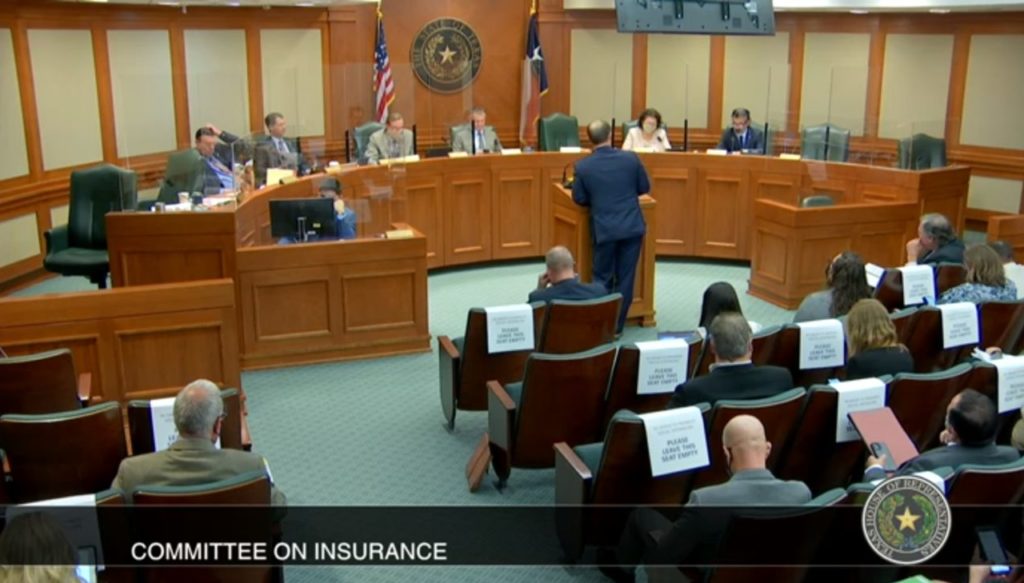
Tex. bill discussion includes DRP repair decisions, supplements, labor rates
By onAnnouncements | Associations | Business Practices | Insurance | Legal | Market Trends | Repair Operations
Legislation related to OEM procedures, labor rate surveys and DRP network promotion produced extensive discussion Monday about how direct repair programs operate in Texas.
The House Insurance Committee conversation Monday included a representative for numerous major insurers declaring their DRP shops are told “‘do what needs to be done'” for a repair, a description of a DRP forcing shops to eat supplements and confusion over DRP shops’ place in the proposed rate surveys.
HB 1131 would require insurers to follow OEM repair procedures and P-pages with the exception of parts, though any alternative components must meet the bill’s definition of “like kind and quality.”
The bill also requires a neutral third party to calculate prevailing rates using posted charges, and it places restrictions on incentives and comments an insurer might make about a particular shop.
For now, the bill remains pending before the committee following its hearing Monday. (Lawmakers take up HB 1131 at about the 03:20:30 mark in the video linked here.)
‘Do what needs to be done’
Committee member Rep. Scott Sandford, R-McKinney, described his recent auto claims experience, which included receiving phone calls from direct repair program body shops after filing. Sanford said they gave the impression he would have to go out-of-pocket for using a different facility.
HB 1131 would block insurers from forcing a DRP “in order for the beneficiary to obtain the repair without owing any out-of-pocket cost other than the deductible.”
Sandford asked Texas Coalition for Affordable Insurance Solutions Executive Director Beaman Floyd about DRP networks. His organization includes State Farm, Allstate, USAA, Farmers, Nationwide and Texas Farm Bureau Insurance as members.
Asked why a repairer would wish to be in a DRP, Floyd cited “efficiencies” in how shops are paid and “shared computer arrangements” which permit estimates to move quickly.
Floyd said insurers have found relationships with DRP shops are a “good customer service arrangement” because many people, “including me” don’t have a body shop of choice.
“I don’t … know anybody who’s in that business,” said Floyd, the insurance industry representative.
Sanford asked if “financial arrangements” like discounts to insurers existed within the DRP agreements.
“Every one of my companies has said to me they do have guidelines and they do use expectations of estimates of how much different things will cost,” Floyd said. “But at the end of the day, each of the claims people … said, “‘Here’re our guidelines. Do what needs to be done to get the car done.’ … That’s a general standard.”
Sanford said the insurers would then “go back and review” but did not elaborate.
Sanford asked if parts were mentioned in DRP agreements. Floyd said most contracts include using both OEM and aftermarket parts “as will best suit the repair and getting the job done.”
He said TCAIS was also asked if shops had “fixed percentages or incentives” for using aftermarket parts.
“The answer from each of my companies was ‘Absolutely not. We have no such thing,'” he said. “… It’s a ‘What do you need to do to get the car fixed? Figure it out.'”
But he said insurers will speak to a repairer they feel is “driving prices up” or “way out of a economic norm.”
Asked by committee member Rep. Dennis Paul, R-Houston, if TCAIS had a problem with requiring OEM procedures, Floyd said “no, we have a problem with the fact that the bill seems to lead inexorably to a very restricted oligopoly … on parts. Because the procedures and the parts are intermingled with one another.”
Floyd then went on to mention direct repair program shops. “We’re actually quite stringent about their technology, and the kind of repairs and what they need to do,” he said.
“It does not behoove us to have substandard repairs,” Floyd said. “And the idea of cost control in that space is not antithetical to quality, we don’t think.” His insurers didn’t want to create a monopoly on parts or “particular shops.”
Counterpoint
But Auto Body Association of Texas board member Chad Kiffe (Berli’s Body & Fine Auto Finishes) said that as general manager of a body shop, he knew firsthand how insurers “dictate to us on how to fix a vehicle.”
“It is extremely difficult to run a business when you have the insurance company trying to tell you how to fix a vehicle, what parts to use, where to buy the parts,” Kiffe continued.
Kiffe also painted lawmakers a less rosy picture of DRP life. “Some aren’t as bad as others,” he said of DRP programs. Others demand a shop write an estimate “within two hours of getting the car.” If the shop discovers more damage, instead of a supplement, “they have to absorb those costs. How does that support the customer’s safety?”
CCC data found 60.9 percent of repairable vehicle claims in 2020 had supplements, typically representing 18.7 percent of the repair cost. The average repair bill was $3,421, which means a shop as Kiffe described it would be eating nearly $640.
“Body shops want to do the right thing,” Kiffe said, but financial pressure on the business meant “they’re gonna cut corners,” he said. This can be concealed from customers, he said, describing it as a case of “lipstick on a pig.”
Kiffe said he had been on a DRP before. “There’s concessions you have to give,” he said.
He said shops are judged on three things: “Fix it cheap. Fix it fast. And keep that customer informed.”
Asked by former body shop owner Rep. Ramon Romero, D-Ford Worth, if NAMIC insurers required their DRP shops to absorb any changes to the estimate, National Association of Mutual Insurance Companies Southwest region Vice President Jon Schnautz said he couldn’t speak to if that was in any DRPs, but he could check with NAMIC members.
Labor rate surveys and DRP shops
American Property Casualty Insurance Association state government relations Vice President Joe Woods attacked the neutral labor rate survey process described in the bill.
HB 1131 would define “(p)revailing rate” as:
the rate identified by a rate survey that is:
(A) conducted by a third party;
(B) designed to be transparent and unbiased; and
(C) based on the posted retail labor rates and not direct repair program shop rates that operate under a contract with an insurer.
Woods told lawmakers this language excluded all DRP shops from the survey.
“You’ve thrown out competition by doing that,” he said.
A representative for HB 1131 sponsor Rep. Travis Clardy, R-Nacogdoches, said the bill was “absolutely’ meant to include DRP shops’ retail rates. A shop wouldn’t be excluded on the grounds on the basis that it was part of a DRP — “absolutely not,” Clardy’s office said. The shop simply had to provide their posted rate, not their DRP rate.
“They do negotiate rates,” Woods said of DRPs. “… ‘We will pay X dollars.'” The insurer will put the shop on a list of regional DRPs for customers willing to use one, he said.
The Auto Body Association of Texas, which supports the bill, said its vision would also be to include DRP shops’ posted retail rates. Only their discounted rates established under individual business deals would be excluded.
“In any kind of survey we would be after the posted door (retail) rates,” Executive Director Jill Tuggle wrote in an email Friday. “This would be more accurate since the DRP rate is basically a bulk discount that is agreed upon by the two parties involved and has nothing to do with anyone else’s rates. … I believe we would want all shops’ retail rates to be included in the survey. What we are after is transparency. Right now, the insurers are the only ones with ‘survey results’ (used very loosely) on things like rates and prevailing common practice. Body shops are not privy to the data or the findings. So essentially we are expected to adhere to these rates and practices under blind acceptance. But to answer your question, we would want all shops included. That would produce accurate results.”
So perhaps the wording of the bill could be clarified, but it appears that the APCIA’s fears are unfounded.
Another exchange seemed to raise the idea of including DRP rates.
Sanford asked if Woods DRP shops were excluded from the bill due to data being unavailable for the survey. Woods said no, and Sanford asked if network shops “would disclose their DRP agreements.”
“I assume so,” Woods said.
But Romero drew attention to the potential volume quid pro quo associated with DRP rate concessions.
He asked about what kind of business growth DRPs had seen in return for the discount. Woods asked if he meant the number of DRPs and said he could find out. Romero asked about loss or incident data over five years to track the amount of business insurers were or weren’t sending to DRPs.
Woods also insinuated the collision industry would violate antitrust laws and collude on price were the bill to pass.
He said DRP shops negotiate a rate “which is gonna be lower than what any body shop out there under this bill would charge, because the Texas Auto Body Shop Association could suggest that their members might want to raise their prices. And they could all raise their prices. And that would just drive up the cost of the average because the DRP shops are not counted in that average.”
There’s no organization named the Texas Auto Body Shop Association, and it’s unclear if Woods meant the Auto Body Association of Texas or was speaking rhetorically about a repair trade group in general. But we contacted ABAT for a response to the assertion.
“My personal rebuttal to the insinuation that ABAT or a group of shops would violate Antitrust laws would be- tell me why would this law encourage that?” Tuggle wrote in an email. “If the insurers are already conducting rate and PCP surveys couldn’t shops do the same now? If their results on their surveys are not skewed or doctored now then that should be a present concern? Interesting that it is only a concern under the circumstances that we are allowed to see the survey results or ask that it be conducted by a neutral party. To suggest that our group would break the law is a question of morals, not new legislation. New laws don’t stop or encourage people from breaking old laws and vice-versa. They’re grabbing for straws.”
Inducements
Schnautz criticized the bill’s elimination of insurers’ abilities to promote DRPs.
In addition to banning insurers from promising no out-of-pocket costs for using a DRP, HB 1131 prohibits insurers from:
(2) intimidating, coercing, or threatening the beneficiary to induce the beneficiary to use a particular repair person or facility; or
(3) offering an incentive or inducement, other than a warranty issued by a repair person or facility, for the beneficiary to use a particular repair person or facility.
The bill also restricts what insurers can tell claimants. They aren’t allowed to “offer, communicate, or suggest in any manner that a particular repair person or facility will provide faster repair times, faster service, or more efficient claims handling than another repair person or facility.”
“The steering is very sophisticated,” Texas Watch Executive Director Ware Wendell told the committee. An insurer will tell shops that if they pick a DRP shop, “‘we can see it tomorrow,'” but if they prefer a different facility, it’ll take the carrier seven days. “That’s not right,” he said.
Though Woods observed insurers lacked the right to require a specific shop. he also described insurers marketing to consumers that “you get a premium discount up front” for employing a DRP facility.
Schnautz said insurers warranty DRP shops’ repairs, but under HB 1131, “you can’t offer any kind of inducement.”
Only a body shop could provide a warranty, Schnautz said.
Schnautz said insurers also couldn’t talk about the benefits of using a DRP “which we think will really undercut that.” He said they felt DRPs represented a system which “on the whole, ought to be preserved.”
Be heard: Texas legislator contact information can be found here and here.
Images:
Texas Coalition for Affordable Insurance Solutions Executive Director Beaman Floyd appears April 13, 2021, before the Texas House Committee on Insurance. (Screenshot from Texas Legislature video)
Auto Body Association of Texas board member Chad Kiffe (Berli’s Body & Fine Auto Finishes) appears April 13, 2021, before the Texas House Committee on Insurance. (Screenshot from Texas Legislature video)
American Property Casualty Insurance Association state government relations Vice President Joe Woods appears April 13, 2021, before the Texas House Committee on Insurance. (Screenshot from Texas Legislature video)
National Association of Mutual Insurance Companies Southwest region Vice President Jon Schnautz appears April 13, 2021, before the Texas House Committee on Insurance. (Screenshot from Texas Legislature video)



